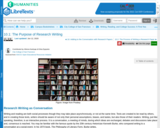
This source discusses the purpose of research writing.
- Subject:
- Composition and Rhetoric
- English Language Arts
- Material Type:
- Textbook
- Provider:
- LibreTexts
- Author:
- Athena Kashyap
- Erika Dyquisto
- Date Added:
- 06/01/2021


This source discusses the purpose of research writing.

Short Description:
Cover Design: Anne Sigrun 1, 2, 3 Write! provides step-by-step instruction to build college writing skills. It combines comprehensive grammar and mechanics review with sentence, paragraph and essay writing techniques and practice. Links to example essays from professional and student writers demonstrate the skills studied and provide reading and critical thinking opportunities.
Long Description:
1, 2, 3 Write! provides step-by-step instruction to build college writing skills. It combines comprehensive grammar and mechanics review with sentence, paragraph and essay writing techniques and practice. Links to example essays from professional and student writers demonstrate the skills studied and provide reading and critical thinking opportunities.
Word Count: 34581
(Note: This resource's metadata has been created automatically by reformatting and/or combining the information that the author initially provided as part of a bulk import process.)

Short Description:
Cover Design: Anne Sigrun 1, 2, 3 Write! provides step-by-step instruction to build college writing skills. It combines comprehensive grammar and mechanics review with sentence, paragraph and essay writing techniques and practice. Links to example essays from professional and student writers demonstrate the skills studied and provide reading and critical thinking opportunities.
Long Description:
1, 2, 3 Write! provides step-by-step instruction to build college writing skills. It combines comprehensive grammar and mechanics review with sentence, paragraph and essay writing techniques and practice. Links to example essays from professional and student writers demonstrate the skills studied and provide reading and critical thinking opportunities.
Word Count: 34581
ISBN: 978-1-998755-60-8
(Note: This resource's metadata has been created automatically by reformatting and/or combining the information that the author initially provided as part of a bulk import process.)
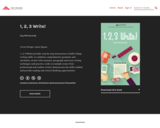
A textbook for WR115 "Introduction to College Writing"
Short Description:
Cover Design: Anne Sigrun 1, 2, 3 Write! provides step-by-step instruction to build college writing skills. It combines comprehensive grammar and mechanics review with sentence, paragraph and essay writing techniques and practice. Links to example essays from professional and student writers demonstrate the skills studied and provide reading and critical thinking opportunities.
Long Description:
1, 2, 3 Write! provides step-by-step instruction to build college writing skills. It combines comprehensive grammar and mechanics review with sentence, paragraph and essay writing techniques and practice. Links to example essays from professional and student writers demonstrate the skills studied and provide reading and critical thinking opportunities.
Word Count: 35250
(Note: This resource's metadata has been created automatically by reformatting and/or combining the information that the author initially provided as part of a bulk import process.)
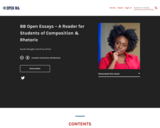
This collection is intended to provide instructors with a wide variety of nonfiction examples of good writing that they can use to teach composition.

PLEASE NOTE: Some K-12 sites block access to Google Docs where this file resides. If you are unable to access it, it is also available at https://human.libretexts.org/Bookshelves/Literature_and_Literacy/Book%3A_88_Open_Essays_-_A_Reader_for_Students_of_Composition_and_Rhetoric_(Wangler_and_Ulrich)
This book is a free and open resource for composition instructors and students, full of essays that could supplement OER rhetoric and writing texts that lack readings. All of the essays in this reader are versatile rhetorically and thematically. It is arranged alphabetically by author name. Each essay has a series of hashtags that apply to the essay in some way. You can search for essays thematically for topics like education, the environment, politics, or health. You can also search for essays based on composition concepts like analysis, synthesis, and research. You can search for essays that are based on shared values, essays that rely heavily on ethos, logos, or pathos, essays that are very kairos-dependent, and essays that are scholarly.
This collection was created in Google Docs so that it is easily adapted and edited.

Word Count: 71834
(Note: This resource's metadata has been created automatically by reformatting and/or combining the information that the author initially provided as part of a bulk import process.)

This resource includes traditional writing prompts as well as prompts and assignments that utilize AI-generated text. It covers the fields of Creative Writing, Composition, and Business and Technical Writing.
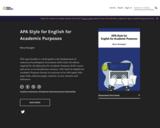
Short Description:
This open booklet is a brief guide to the fundamentals of American Psychological Association (APA) Style 7th edition required for the Education for Academic Purposes (EAP) course and serves as an introductory resource. APA Style for English for Academic Purposes focuses on structure of an APA paper (title page, body, reference page), citations, in-text citations and references.
Word Count: 7036
Included H5P activities: 3
(Note: This resource's metadata has been created automatically by reformatting and/or combining the information that the author initially provided as part of a bulk import process.)
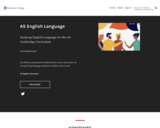
An inhouse produced workbook that covers the basics of recognising language elements within a given text.
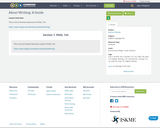
This is one of several resources for ENGL 124. https://openoregon.pressbooks.pub/aboutwriting/
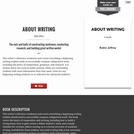
Revised Edition
Short Description:
This writer’s reference condenses and covers everything a beginning writing student needs to successfully compose college-level work, including the basics of composition, grammar, and research. It is broken down into easy-to-tackle sections, while not overloading students with more information than they need. Great for any beginning writing students or as reference for advanced students! Order a print copy: http://www.lulu.com/shop/robin-jeffrey/about-writing/paperback/product-23853977.html
Long Description:
This writer’s reference condenses and covers everything a beginning writing student should need to successfully compose college-level work. The book covers the basics of composition and revising, including how to build a strong thesis, how to peer review a fellow student’s work, and a handy checklist for revision, before moving on to a broad overview of academic writing. Included for those students who need writing help at the most basic level are comprehensive sections on sentence style and grammar, verbs, nouns and other tenets of basic grammar. Finally, the sections on research and citation should help any student find solid evidence for their school work and cite it correctly, as well as encouraging an understanding of why citation is so important in the first place. This is a guide that is useful to writing students of all levels, either as a direct teaching tool or a simple reference.
This revised edition incorporates new sections on revision, citation, and rhetorical concepts. More example text has been provided and the contents have been reorganized to optimize flow and student comprehension. The first edition remains available at About Writing.
Order a print copy: http://www.lulu.com/shop/robin-jeffrey/about-writing/paperback/product-23853977.html
Word Count: 11905
ISBN: 978-1-63635-000-4
(Note: This resource's metadata has been created automatically by reformatting and/or combining the information that the author initially provided as part of a bulk import process.)

A CBU guide
Short Description:
Original version attribution to: Ulrike Kestler. Revised version by: Donnie Calabrese, Emma Russell, Jasmine Hoover and Tammy Byrne.
Word Count: 9554
(Note: This resource's metadata has been created automatically by reformatting and/or combining the information that the author initially provided as part of a bulk import process.)

Word Count: 64590
(Note: This resource's metadata has been created automatically by reformatting and/or combining the information that the author initially provided as part of a bulk import process.)
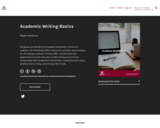
Short Description:
Designed specifically for Kwantlen Polytechnic University students, this Pressbook offers interactive activities and strategies for developing academic writing skills. Learners have the opportunity to review key parts of the writing process from interpreting their assignment instructions, organizing their ideas, drafting their writing, and revising their work.
Long Description:
Designed specifically for Kwantlen Polytechnic University students, this Pressbook offers interactive activities and strategies for developing academic writing skills. Learners have the opportunity to review key parts of the writing process from interpreting their assignment instructions, organizing their ideas, drafting their writing, and revising their work.
Word Count: 6085
Included H5P activities: 8
ISBN: 978-1-9991981-5-2
(Note: This resource's metadata has been created automatically by reformatting and/or combining the information that the author initially provided as part of a bulk import process.)
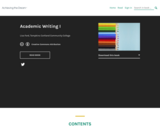
Long Description:
Composition I focuses on principles of writing, critical reading and essay composition using rhetorical styles common in college-level writing (narrative, example/illustration, compare/contrast, cause-and-effect, argument).
Word Count: 59495
(Note: This resource's metadata has been created automatically by reformatting and/or combining the information that the author initially provided as part of a bulk import process.)

Short Description:
Designed specifically for UQ College students, this Pressbook offers interactive activities and strategies for developing academic writing skills. Students will have the opportunity to review key parts of the writing process from interpreting their assignment instructions, organizing their ideas, drafting their writing, and revising their work before final submission. In addition, students will learn key oral presentation skills for both group and individual class presentations and there is the opportunity to also develop students' critical thinking skills.
Long Description:
Designed specifically for UQ College Academic English Tertiary Preparation Program students, this Pressbook offers interactive activities and strategies for developing and refining academic writing skills. Learners are introduced to the writing basics, such as parts of speech, sentence and paragraph structure, right through to writing, editing , and refining their own essay. Students will have the opportunity to review key parts of the writing process from interpreting their assignment instructions, organizing their ideas, drafting their writing, and revising their work before final submission. In addition, students will learn key oral presentation skills for both group and individual class presentations. Also, it offers students the opportunity to develop as critical thinkers and write sound and valid academic arguments. The contents are supported by in-class practice and while it has been designed as an integral part of the TPP Academic English syllabus, it will enhance the writing skills of anyone new to academic writing.
Word Count: 25064
ISBN: 978-1-74272-364-8
(Note: This resource's metadata has been created automatically by reformatting and/or combining the information that the author initially provided as part of a bulk import process.)
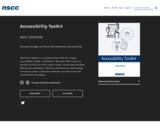
NSCC EDITION
Short Description:
The NSCC Edition is a revised version of the BC Campus Accessibility Toolkit - 2nd Edition. The goal of this book is to provide resources for each content creator, instructional designer, educational technologist, librarian, administrator, and teaching assistant to create a truly open textbook—one that is free and accessible for all students.
Word Count: 13596
ISBN: 978-1-77420-030-8
(Note: This resource's metadata has been created automatically by reformatting and/or combining the information that the author initially provided as part of a bulk import process.)

Short Description:
The goal of the Accessibility Toolkit - 2nd Edition is to provide resources for each content creator, instructional designer, educational technologist, librarian, administrator, and teaching assistant to create a truly open textbook—one that is free and accessible for all students. This is a collaboration between BCcampus, Camosun College, and CAPER-BC.
Long Description:
The goal of the Accessibility Toolkit – 2nd Edition is to provide resources for each content creator, instructional designer, educational technologist, librarian, administrator, and teaching assistant to create a truly open textbook—one that is free and accessible for all students.
This second edition has built upon, and improved, the original toolkit—a collaboration between BCcampus, Camosun College, and CAPER-BC—with a new “Accessibility Statements” chapter, bibliography and list of links by chapter for print users in the back matter, updated information, and corrections to content, style and layout.
The French translation of the first edition of the Accessibility Toolkit—La Trousse d’outils d’accessibilité —is still available. In time, a French translation of this second edition will be made available.
Word Count: 14269
(Note: This resource's metadata has been created automatically by reformatting and/or combining the information that the author initially provided as part of a bulk import process.)

Short Description:
The goal of the Accessibility Toolkit - 2nd Edition is to provide resources for each content creator, instructional designer, educational technologist, librarian, administrator, and teaching assistant to create a truly open textbook—one that is free and accessible for all students. This is a collaboration between BCcampus, Camosun College, and CAPER-BC.
Long Description:
The goal of the Accessibility Toolkit – 2nd Edition is to provide resources for each content creator, instructional designer, educational technologist, librarian, administrator, and teaching assistant to create a truly open textbook—one that is free and accessible for all students.
This second edition has built upon, and improved, the original toolkit—a collaboration between BCcampus, Camosun College, and CAPER-BC—with a new “Accessibility Statements” chapter, bibliography and list of links by chapter for print users in the back matter, updated information, and corrections to content, style and layout.
The French translation of the first edition of the Accessibility Toolkit—La Trousse d’outils d’accessibilité —is still available. In time, a French translation of this second edition will be made available.
Word Count: 14319
(Note: This resource's metadata has been created automatically by reformatting and/or combining the information that the author initially provided as part of a bulk import process.)